Algerian Sci-Tech Scholars and Competences Abroad consists of a team of multi-disciplinary scientists located around the globe whose goal is to connect Sci-Tech researchers and entrepreneurs in Algeria.
Mission
Algerian Sci-Tech Scholars and Competences Abroad wants to promote excellence in Algerian Sci-Tech Research, Start-Up Collaboration, and Partnership.
Objective
The Algerian Sci-Tech Scholars and Competences Abroad wants a portal that will enable the users to:
- Search for Algerian Sci-Tech collaborators
- Submit ideas for collaboration and exchanges
- Dynamic announcement of worldwide Sci-Tech resource information
- Link and Navigation of worldwide Sci-Tech networks and journals
Vision
- To be the Hub of Algerian Sci-Tech Exchange In support of Algerian Institutions.
- The portal builds up the information sharing and realizes the material resource sharing through the information and networking technology.
- Facilitate the science and technology resource exchange and collaboration
- Give opportunity to all of those who want to contribute to Algeria Sci-Tech to be involved.
- Ensure the equal opportunity for the whole society to share the science and technology resources and participate in the science and technology innovation.
- Promote the ability of the science and technology innovation in Algeria.
- Attract Investors and entrepreneurs to consider Algerian Sci-Tech projects
Leadership
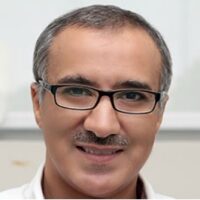
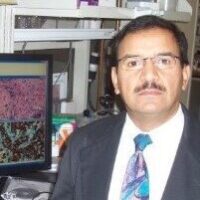
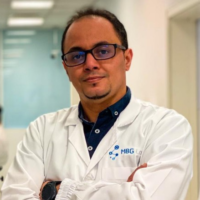

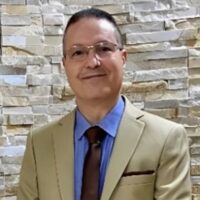
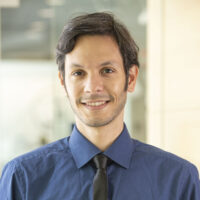
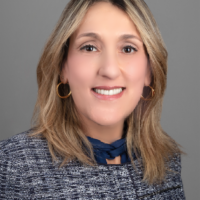
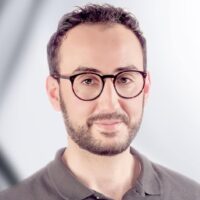
Dr. Mohamed Boudjelal
Dr. Mohamed Boudjelal, Director of Drug Discovery and Chairman of Core Facility, KAIMRC, Riyadh, Kingdom of Saudi Arabia.
Dr. Boudjelal is the inventor of a number of therapies, a few of which are marketed medicines.
He is a member of a number of international research organizations:
- Member of the Algerian Science and Technology Council
- Founding member of the Algerian Competences Association
- Founding Member of the Science Edit For the Developing World.
Dr. Ahmed Chenna
Dr. Ahmed Chenna holds a Ph.D. from the University of Strathclyde University, Glasgow, Scotland, (UK), and worked as a postdoctoral researcher, at the Department of Pharmacological Sciences, School of Medicine, the State University of New York at Stony Brook, then as a staff Scientist in the University of Berkeley-Lawrence Berkeley National Laboratory and as a senior scientist and lab supervisor in the Advanced Technologies Group in ACLARA Biosciences. Dr. Chenna also worked as a principal scientist in the oncology group at Monogram Biosciences Inc and is currently in Laboratory Corporation of America, Oncology and Neurosciences research.
Dr. Chenna authored over 90 technical publications & conference abstracts including 13 US patents and has over 30 years of experience in research, development, and supervision of scientists, research associates, and graduate students in academia and biotechnology companies.
Dr. Mohamed Belhocine
Mohamed Belhocine, Assistant Professor at the Molecular Medicine Department of the Jawhara Center and Arabian Gulf University of Bahrain. Mohamed holds an MSc in Microbiology from the University of Blida (Algeria), a bachelor’s Degree in cell and molecular biology, an MSc in bioinformatics, genomics and structural biochemistry, and a PhD. in Bioinformatics and Genomics from Luminy University (France).
His research focuses on the application of large-scale genomic approaches to understand epigenetic mechanisms associated with the development of normal and leukemic lymphoid cells. Through his experience in laboratories as the Center of Immunology Marseille Luminy (CIML) and the Technological Advances for Genomics and Clinics Laboratory (TAGC), Mohamed has acquired extensive knowledge in experimental and computational biology, specifically in transcriptome analysis and chromatin immuno-precipitation coupled with deep sequencing (CHIP-Seq) and RNA-sequencing analysis. Mohamed is proficient in R, python, and JAVA. Mohamed is a Senior Bioinformatician at Jawhara Center, supervising a clinical NGS analysis. Additionally, Mohamed develops and oversees research training programs at several Algerian universities.
Dr. Djaouida Chenaf
Dr. Djaouida Chenaf is a full professor of civil engineering at the Royal Military College of Canada. She is also an adjunct professor in the department of CGM at Ecole Polytechnique of Montreal. She obtained her Bachelor’s degree in Civil Engineering specializing in structural design from the University of Sciences and Technology of Algiers in 1988, an MSc in Soil mechanics and géotechnique from Université de Moncton in NB, and a Ph.D. in Hydrogeology and Environmental studies from Ecole Polytechnique of Montreal. Her current research interests are in geotechnical engineering, physical hydrogeology and groundwater control and dewatering, non-destructive methods applied to soils-water-structure interactions under static and dynamic loadings, climate change effects on the hydro-mechanical behaviors of both frozen and unfrozen soils, Geo-hazards considerations in designing new infrastructures and rehabilitation of existing ones.
Dr. Said Dermime
Senior Scientist, Director of Translational Cancer Research Facility.
National Center for Cancer Care and Research Hamad Medical Corporation.
Adjunct Associate Professor, Hamad Bin Khalifa University.
Dr. Said Dermime obtained his PhD degree in immunology from Salford University, Manchester, UK in 1992. He then joined the NCI, Milan (Italy) from 1992-1994; then the NHLBI, NIH, (USA) from 1995-1997 as postdoctoral fellow. He was a Leader of the Lymphoma-Cancer Vaccine Team at the Paterson Institute for Cancer Research, Manchester (UK) for a period of 5 years; then he was appointed as Senior Scientist to establish and lead the Tumor Immunology Section at King Faisal Specialist Hospital & Research Centre, Riyadh (KSA) for a period of 6 years. In 2015, Dr. Said joined NCCCR at HMC, Doha (Qatar) as a director of the Translational Cancer Research Facility. Dr. Said published over 90 peer-reviewed articles in high impact factor journal. He also published several Book Chapters in prestigious publishers and an editor reviewer for the Frontiers in Immunology journal and a reviewer for many prestigious international scientific journals. Dr. Said obtained several grants and supervised many Master and PhD students.
Dr. Faez Amokrane Nait Mohamed
Dr Faez Amokrane Nait Mohamed is currently a Research fellow in Immunology at the Ragon Insitute of MGH, MIT and Harvard and a research fellow in Medicine at Harvard Medical School, working on Influenza vaccines and understanding how antigenic sites of vulnerability are initially perceived by specific germline B cell receptor (BCR) sequences and how that recognition process can direct antibody affinity maturation toward production of broadly neutralizing anti-viral responses. He holds a BSc in Biochemistry, a MSc in Pharmacology and a PhD in Immunology, all obtained at the University of Science and technology Houari Boumediene (USTHB), Algiers, Algeria. Before coming to Boston, he joined the department of Cellular and Molecular Biology at USTHB as an assistant professor and he was an active member of the pedagogical and external relations of the University. His hobbies are running, drinking coffees, optimizing the ergonomics of his bench set up and spending time with his family.
Dr. Malika Aid-Boudries
Dr. Aid-Boudries is an Assistant professor of Medicine at the Center for Virology and Vaccine Research (CVVR). She received her Ph.D. in Computational Biology and Bioinformatics from the Center for Immunology and Cancer at the University of Montreal, Quebec, Canada. At CVVR, her research focuses on developing computational pipelines and machine learning-based approaches (ML/AI) to investigate OMICS signatures associated with disease pathogenesis, baseline and post-vaccination predictor biomarkers of vaccines immunogenicity, and durability. Dr. Boudries is also exploring disease pathogenesis through epigenetics profiling, with a keen interest in decoding the epigenetics determinant of HIV integration and the latent HIV reservoir maintenance and persistence.
Dr. Bilal Djeghout
Dr. Djeghout is a post-doctoral research scientist at the Quadram Institute Bioscience, England, United Kingdom. He has built his expertise in microbial genomics and metagenomics of intestinal infectious diseases at the Quadram Institute in Dr. Nicol Janecko’s research group which focuses on characterising microbial threats in the food chain through culture based and metagenomic approaches. Dr. Djeghout designed a targeted metagenomic method from sample processing to sequencing for the detection and characterisation of Campylobacter in campylobacteriosis human cases. Moreover, he is presently involved in analysing metagenomic sequencing data to decipher microbial ecosystems’ diversity, composition, and functionality. Previous to this, Dr Djeghout was obtained a BSc and MSc degree from the University of 8 May 45 in Guelma, Algeria, and PhD in microbiology from the School of Life Sciences and Biotechnologies at the University of Sassari, Italy. His dissertation project was the genotypic and phenotypic characterisation of Salmonella serovars and antimicrobial resistance determinants isolated from human and poultry samples. An advocate for scientific collaboration, Dr Djeghout is passionate about fostering interdisciplinary research and bridging global Sci-Tech communities, including initiatives supporting Algerian scholars and professionals worldwide.
